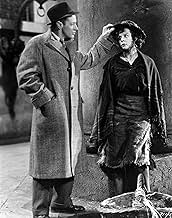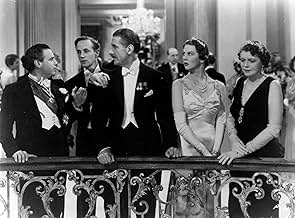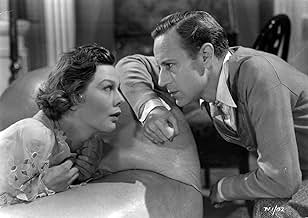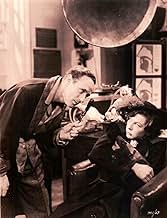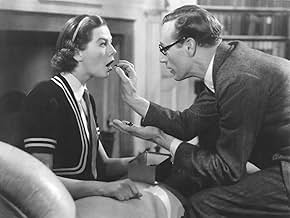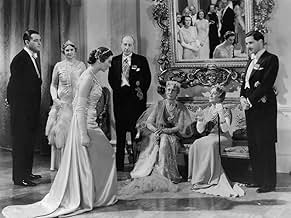Pygmalion
- 1938
- Tous publics
- 1h 36min
NOTE IMDb
7,7/10
9,9 k
MA NOTE
Un expert en phonétique et en diction fait le pari qu'il peut apprendre à une fille aux fleurs de cockney à parler un anglais correct et à se faire passer pour une dame de la haute société.Un expert en phonétique et en diction fait le pari qu'il peut apprendre à une fille aux fleurs de cockney à parler un anglais correct et à se faire passer pour une dame de la haute société.Un expert en phonétique et en diction fait le pari qu'il peut apprendre à une fille aux fleurs de cockney à parler un anglais correct et à se faire passer pour une dame de la haute société.
- Récompensé par 1 Oscar
- 3 victoires et 5 nominations au total
Leueen MacGrath
- Clara Eynsford Hill
- (as Leueen Macgrath)
Irene Browne
- Duchess
- (as Irene Brown)
Cathleen Nesbitt
- A Lady
- (as Kathleen Nesbitt)
Histoire
Le saviez-vous
- AnecdotesThe scene in which Eliza accidentally swallows a marble while having an elocution lesson does not appear in the original play. During rehearsals for this scene, a pained expression came over Wendy Hiller's face. When she spat out the marbles she had in her mouth, she said, "Leslie, I've swallowed one!" to which Leslie Howard replied, "Never mind, there are plenty more." This caused such amusement among the watching crew that it was added to the movie and to its musical version, My Fair Lady (1964).
- GaffesAfter the ball when Mrs. Pearce serves Professor Higgins his tea, the shadow of the camera can be seen in the bottom left, moving back across his blanket.
- Citations
Eliza Doolittle: Walk? Not bloody likely. I'm going in a taxi.
- Crédits fousOpening credits prologue: PYGMALION WAS A MYTHOLOGICAL CHARACTER WHO DABBLED IN SCULPTURE. HE MADE A STATUE OF HIS IDEAL WOMAN-GALATEA. IT WAS SO BEAUTIFUL THAT HE PRAYED THE GODS TO GIVE IT LIFE. HIS WISH WAS GRANTED.
BERNARD SHAW IN HIS FAMOUS PLAY GIVES A MODERN INTERPRETATION OF THIS THEME.
- Versions alternativesThis film was made a year before the Hays Office gave Clark Gable permission to say "Frankly, my dear, I don't give a damn", so while in the British prints of this film Leslie Howard often utters the word, in the American prints the word "damn" is replaced by either "hang" or "confounded".
- ConnexionsFeatured in Metro-Goldwyn-Mayer's Big Parade of Hits for 1940 (1940)
Commentaire à la une
George Bernard Shaw wrote the play "Pygmalion" in 1912 and 1913 as part-social protest, part-satire, part-comedy of manners. Its central character, Henry Higgins, a London teacher of elocution and expert in regional phonetics, makes a small wager with his friend and colleague, Colonel George Pickering, that he can take a waif from the streets, one Eliza Doolittle, and pass her off as the cream of the social crop. Using a pedagogical technique consisting mostly of inhumane badgering and humiliation, he manages to pull off the feat with unexpected success – but at an emotional cost he does not foresee.
Besides the inventive montages illustrating Higgins' transformation of Eliza from Cockney flower-girl to the statuesque, gowned beauty who's mistaken for a royal princess at a diplomatic reception, there are additional items that failed to materialize in Shaw's original – the use of the phrases, "The rain in Spain stays mainly in the plains" and "Hurricanes hardly happen in Hartford, Hereford, and Hampshire," both of which later became lyrics for Lerner and Lowe's musical version. And in the play, Higgins's irritating Hungarian nemesis is not given a name; here, for the first time, he is dubbed "Kaparthy."
Leslie Howard, who co-directed this 1938 film, impersonates Higgins as hard-core realist - diabolical, profane, impatient, sometimes maddening. And as Eliza, Wendy Hiller has her coy moments, particularly when she is "tried out" at a tea party given by Higgins's mother. Her carefully high-toned enunciation of "the new slang" is timed to perfection.
The film, unfortunately, leaves one with the feeling that at the story's conclusion - with Higgins quietly demanding to know from Eliza the whereabouts of his slippers - both student and mentor "live happily ever after." This contrived ending must have been a compromise on the part of the producer, Gabriel Pascal, although one finds it mystifying that Shaw, who is credited with the story's adaptation, would have ever endorsed such a sentimental ending. For as Shaw had written at the end of his play over two decades earlier, "the rest of the story need not be shown...if our imaginations were not so enfeebled by their lazy dependence on the...reach-me-downs of the rag shop in which Romance keeps its stock of happy endings..." The playwright then proceeded into seven pages of prose, describing an epilogue in which Eliza married the worshipful young suitor, Freddy Eynsford-Hill, and the generous Colonel Pickering set up the newlyweds in their own business near Victoria Station. As for any relationship between Higgins and Eliza, according to Shaw, "(to this day) he storms and bullies and derides; but she stands up to him so ruthlessly that the Colonel has to ask her from time to time to be kinder to Higgins." As is the aftermath of most good stories, the worm indeed did turn.
With Wilfrid Lawson as Eliza's father, Alfred; Scott Sunderland as Pickering; and David Tree impersonates the shallow but inoffensive Freddy in high style. (He would do the same with the role of Charles Lomax three years later in "Major Barbara.") If the American schleps and male-pushovers that Ralph Bellamy used to play in "The Awful Truth" and "His Girl Friday" ever had a British cousin, David Tree was it; he did the upper-class twit better than anyone.
Besides the inventive montages illustrating Higgins' transformation of Eliza from Cockney flower-girl to the statuesque, gowned beauty who's mistaken for a royal princess at a diplomatic reception, there are additional items that failed to materialize in Shaw's original – the use of the phrases, "The rain in Spain stays mainly in the plains" and "Hurricanes hardly happen in Hartford, Hereford, and Hampshire," both of which later became lyrics for Lerner and Lowe's musical version. And in the play, Higgins's irritating Hungarian nemesis is not given a name; here, for the first time, he is dubbed "Kaparthy."
Leslie Howard, who co-directed this 1938 film, impersonates Higgins as hard-core realist - diabolical, profane, impatient, sometimes maddening. And as Eliza, Wendy Hiller has her coy moments, particularly when she is "tried out" at a tea party given by Higgins's mother. Her carefully high-toned enunciation of "the new slang" is timed to perfection.
The film, unfortunately, leaves one with the feeling that at the story's conclusion - with Higgins quietly demanding to know from Eliza the whereabouts of his slippers - both student and mentor "live happily ever after." This contrived ending must have been a compromise on the part of the producer, Gabriel Pascal, although one finds it mystifying that Shaw, who is credited with the story's adaptation, would have ever endorsed such a sentimental ending. For as Shaw had written at the end of his play over two decades earlier, "the rest of the story need not be shown...if our imaginations were not so enfeebled by their lazy dependence on the...reach-me-downs of the rag shop in which Romance keeps its stock of happy endings..." The playwright then proceeded into seven pages of prose, describing an epilogue in which Eliza married the worshipful young suitor, Freddy Eynsford-Hill, and the generous Colonel Pickering set up the newlyweds in their own business near Victoria Station. As for any relationship between Higgins and Eliza, according to Shaw, "(to this day) he storms and bullies and derides; but she stands up to him so ruthlessly that the Colonel has to ask her from time to time to be kinder to Higgins." As is the aftermath of most good stories, the worm indeed did turn.
With Wilfrid Lawson as Eliza's father, Alfred; Scott Sunderland as Pickering; and David Tree impersonates the shallow but inoffensive Freddy in high style. (He would do the same with the role of Charles Lomax three years later in "Major Barbara.") If the American schleps and male-pushovers that Ralph Bellamy used to play in "The Awful Truth" and "His Girl Friday" ever had a British cousin, David Tree was it; he did the upper-class twit better than anyone.
Meilleurs choix
Connectez-vous pour évaluer et suivre la liste de favoris afin de recevoir des recommandations personnalisées
- How long is Pygmalion?Alimenté par Alexa
Détails
- Date de sortie
- Pays d’origine
- Langue
- Aussi connu sous le nom de
- Pigmalion
- Lieux de tournage
- Pinewood Studios, Iver Heath, Buckinghamshire, Angleterre, Royaume-Uni(studio: made at Pinewood Studios England)
- Société de production
- Voir plus de crédits d'entreprise sur IMDbPro
Box-office
- Budget
- 87 000 £GB (estimé)
- Durée1 heure 36 minutes
- Couleur
- Rapport de forme
- 1.37 : 1
Contribuer à cette page
Suggérer une modification ou ajouter du contenu manquant


